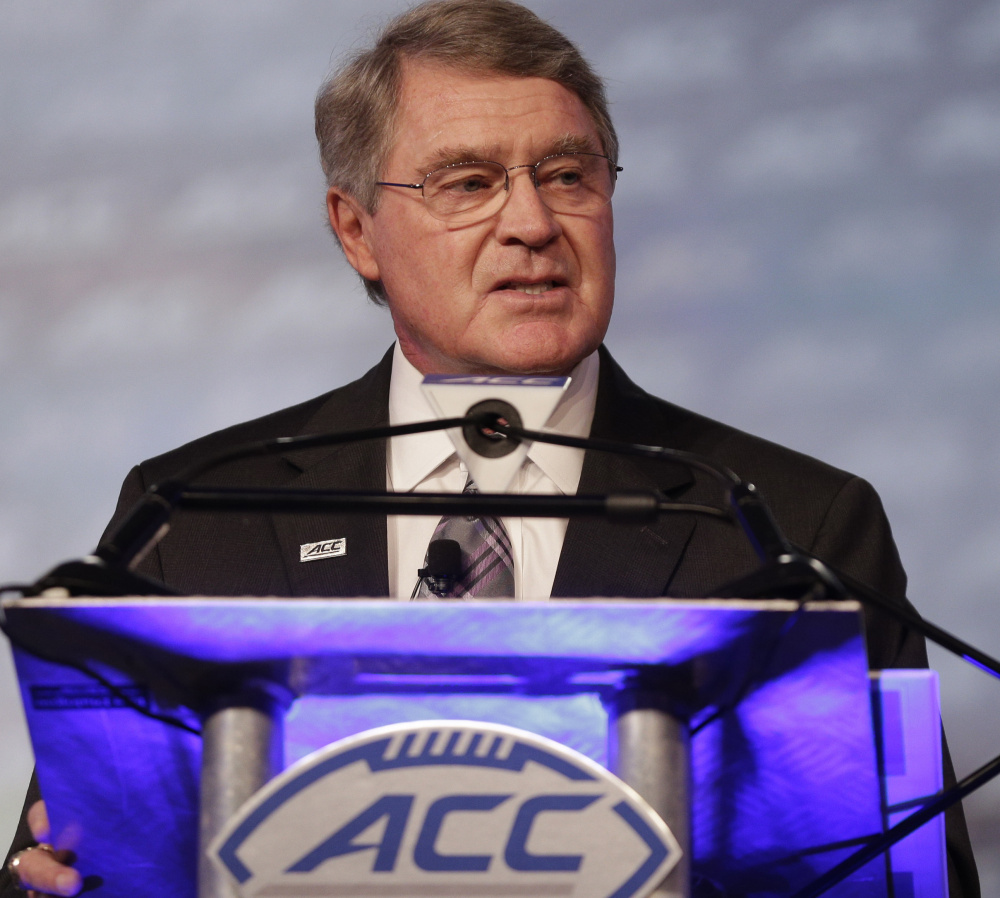The words and message were clear. John Swofford, the commissioner of the Atlantic Coast Conference, left no doubt about the ACC’s responsibility and mandate.
“Discrimination is a public concern,” Swofford said. “What our conference has to do is not become overly reactionary, but do what is right and just, and what we’re supposed to be doing as educational institutions.”
Swofford said that in 1983, while serving as North Carolina athletic director, the ACC debated whether to move its golf tournament from Northgreen Country Club in Rocky Mount, North Carolina, which refused to admit black members. The chancellors of North Carolina and N.C. State eventually forced a recalcitrant ACC to move the tournament.
On Wednesday, three decades later, the ACC moved all 10 of its neutral-site championships out of North Carolina over a state law limiting protections for LGBT people.
Why did it take months for Swofford to demonstrate the same courage and sense of justice as ACC commissioner?
Why was the ACC for so long, by any standard, overly reactionary when it came to House Bill 2?
It took the NCAA’s decision Monday night to pull seven different championships from North Carolina in 2016-17, including the first and second rounds of the men’s basketball tournament in Greensboro, to provoke Swofford into abandoning a curiously tepid approach to HB2. Even then, it took almost four hours after the NCAA’s announcement for Swofford to reveal his change of heart.
“On a personal note,” Swofford’s statement read, “it’s time for this bill to be repealed as it’s counter to basic human rights.”
Even after the NBA moved the 2017 All-Star Game out of Charlotte because it felt HB2 created an environment hostile to the LGBT community, the ACC remained passive – just as it was in 1983 before enlightenment was forced upon it, ironically enough by Swofford and others, when it hired a law firm to verify it wasn’t breaking any laws holding the tournament at Northgreen.
“It’s strictly a moral issue whether to play or not,” ACC spokesman Skeeter Francis said at the time, defending the decision to play at Northgreen, as if that was grounds for inaction.
The ACC was in the middle of a seven-year deal with Northgreen, which had become a stable host for a tournament that had long struggled to gain a foothold. Perhaps that’s why the ACC was so willing to overlook Northgreen’s discriminatory membership policies.
A neighborhood resident, Steven Rogers, a black man who lived near the club’s second fairway, objected to the ACC holding a tournament at a club that would not admit him and restricted the use of club facilities by black guests. Rogers set up signs in his yard that read “rACCist” and “Black Wolfpack can’t be members of racist Northgreen.”
The chancellors at N.C. State and North Carolina, Bruce Poulton and Christopher Fordham, pushed the ACC to move the tournament when Commissioner Bob James initially would not, sending James a confidential letter that implied the two universities would boycott the tournament if it was not moved. A month later the ACC reversed course and moved the tournament to Pinehurst No. 2.
After Northgreen changed its membership policies, the ACC went back for a six-year run starting in 1989. The protest presaged controversies that would come crashing down on professional golf in the early 1990s, and Northgreen would likely later have been swept along by history, but the ACC accelerated the pace of change.
The NBA and NCAA, in the case of HB2, were unwilling to await the sweep of history.
There’s no question it’s easier to move one golf tournament many months in advance than it is to move the 10 neutral-site championships the ACC had scheduled for North Carolina in 2016-17. And there’s no question this isn’t solely up to Swofford, who has 15 school presidents and chancellors to wrangle at a group meeting this week at Clemson.
There’s also no question it’s feasible and that Swofford can bend those presidents and chancellors to his will with ease if he desires.
Because, and this is important, there was another word in Swofford’s statement in 1983. The first word. “Racial” – “Racial discrimination is a public concern,” is what he actually said.
It remains incumbent upon Swofford to prove that in his world, and for the ACC today, all forms of discrimination are a public concern.
Send questions/comments to the editors.



Success. Please wait for the page to reload. If the page does not reload within 5 seconds, please refresh the page.
Enter your email and password to access comments.
Hi, to comment on stories you must . This profile is in addition to your subscription and website login.
Already have a commenting profile? .
Invalid username/password.
Please check your email to confirm and complete your registration.
Only subscribers are eligible to post comments. Please subscribe or login first for digital access. Here’s why.
Use the form below to reset your password. When you've submitted your account email, we will send an email with a reset code.